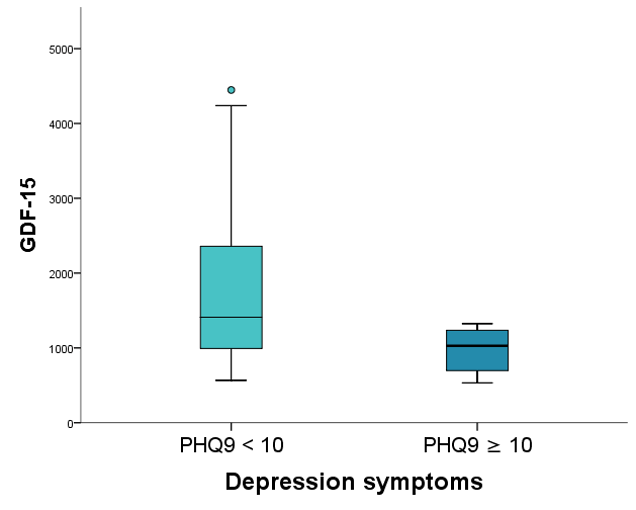Session Information
Date: Tuesday, October 28, 2025
Title: (2227–2264) Rheumatoid Arthritis – Diagnosis, Manifestations, and Outcomes Poster III
Session Type: Poster Session C
Session Time: 10:30AM-12:30PM
Background/Purpose: Depression is a common comorbidity in rheumatoid arthritis patients and has a significant effect on the disease course. [Brock J, et al. Nat Rev Rheumatol. 2023;19(12):790-804]. Growth differentiation factor 15 (GDF-15), a member of the TGFβ family, has been associated not only with endothelial dysfunction but also with several mental diseases, such as depression and psychosis [Kumar P, et al. Sci Rep. 2017;7(1):7906]. This study aimed to determine the differences in GDF-15 levels between RA patients with and without depressive symptoms and to explore the correlation between GDF-15 levels and depression symptoms.
Methods: Patients fulfilling the 2010 ACR/EULAR classification criteria for seropositivity RA were included in this cross-sectional observational study. Patients with moderate or severe disease activity according to DAS28 and fibromyalgia were excluded. The PHQ-9 was used for the evaluation of depressive symptoms, and a score of 10 was considered the cutoff point. GDF15 was measured in the serum by ELISA and is expressed in picograms/milliliters. Exploratory bioinformatics analysis was conducted via the miRNet 2.0 platform (https://www.mirnet.ca/) in order to explore shared microRNA regulators potentially linking these conditions in patients with RA. This analysis was performed by selecting “Diseases” as the input category to include rheumatoid arthritis and depression and “Genes” to include GDF-15. The data are presented as percentages, means ± standard deviations or medians, and interquartile ranges (IQRs) according to their distributions. The Mann‒Whitney U test was used for comparison. The correlation between the GDF-15 score and PHQ-9 score was evaluated via Spearman’s method. A value of p <0.05 was considered statistically significant.
Results: Fifty-six patients were invited; however, 2 were excluded because they were negative for RF and ACPA, 10 because they had moderate or severe RA disease activity, and 5 because they had fibromyalgia. A total of 39 patients were analyzed. Thirty-six (92%) were female. The mean age was 58 ± 11 years. Thirty-four patients were in remission, and only 5 had mild disease activity according to the DAS28. The most common comorbidities were hypertension (41%), diabetes (26%) and Sjögren´s syndrome (15%). In the group of patients with fewer depressive symptoms (PHQ-9 < 10, n=30), the mean GDF-15 score was 1410 (993–2359), whereas it was 1027 (697–1236) in the group with severe depressive symptoms (PHQ-9 >10, n=9), figure 1 (p=0.007). A negative correlation between PHQ-9 and GDF-15 levels was found (Rho= -0.377, p=0.018). According to bioinformatics (figure 2), the analysis identified two microRNAs, hsa-miR-16-5p and hsa-miR-92a, as shared elements associated with RA, GDF-15, and depression.
Conclusion: The levels of GDF-15 are inversely correlated with the severity of depression, and similar results in other mental diseases (psychosis) have been reported. A possible molecular connection may exist between RA and depressive symptoms, primarily through GDF15-related mechanisms and independent of active inflammatory status. However, further studies are needed.
 Figure 1. GDF-15 levels between RA patients with and without depressive symptoms
Figure 1. GDF-15 levels between RA patients with and without depressive symptoms
.gif) Figure 2. Interaction network: bioinformatic analysis
Figure 2. Interaction network: bioinformatic analysis
To cite this abstract in AMA style:
Roldan Ortega J, Peña M, Aranda Cano E, Viruel L, Palafox Sosa I, Vera Bustamante D, Sanchez-Muñoz F, Juarez-Vicuña Y, Martinez-Martinez L. Differences In GDF-15 Levels In Rheumatoid Arthritis Patients With Remission Or Mild Disease Activity Are Associated With Fewer Depressive Symptoms: Clinical Data And Bioinformatic Analysis [abstract]. Arthritis Rheumatol. 2025; 77 (suppl 9). https://acrabstracts.org/abstract/differences-in-gdf-15-levels-in-rheumatoid-arthritis-patients-with-remission-or-mild-disease-activity-are-associated-with-fewer-depressive-symptoms-clinical-data-and-bioinformatic-analysis/. Accessed .« Back to ACR Convergence 2025
ACR Meeting Abstracts - https://acrabstracts.org/abstract/differences-in-gdf-15-levels-in-rheumatoid-arthritis-patients-with-remission-or-mild-disease-activity-are-associated-with-fewer-depressive-symptoms-clinical-data-and-bioinformatic-analysis/
